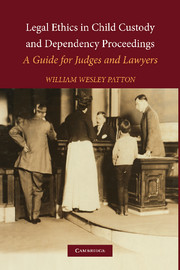Book contents
- Frontmatter
- Contents
- Foreword, by Martin Guggenheim
- Acknowledgments
- Introduction
- 1 Conflicts of Interest
- 2 Competent and Zealous Representation
- 3 Confidentiality
- 4 The Ethics of Alternative Dispute Resolution in Child Custody and Dependency Proceedings
- 5 Ethical Considerations and Constraints in Child Custody and Dependency Appeals
- 6 The Constitutionality of Legislative and Executive Regulation of the Practice of Law and Defining the Attorney-Client Relationship
- Appendix A National Association of Counsel for Children Standards
- Appendix B American Bar Association Standards of Practice for Lawyers Who Represent Children in Abuse and Neglect Cases
- Appendix C In re Car Simulation and Analysis
- Other Authorities
- Cases and Ethics Opinions
- Index
Appendix B - American Bar Association Standards of Practice for Lawyers Who Represent Children in Abuse and Neglect Cases
Published online by Cambridge University Press: 24 July 2009
- Frontmatter
- Contents
- Foreword, by Martin Guggenheim
- Acknowledgments
- Introduction
- 1 Conflicts of Interest
- 2 Competent and Zealous Representation
- 3 Confidentiality
- 4 The Ethics of Alternative Dispute Resolution in Child Custody and Dependency Proceedings
- 5 Ethical Considerations and Constraints in Child Custody and Dependency Appeals
- 6 The Constitutionality of Legislative and Executive Regulation of the Practice of Law and Defining the Attorney-Client Relationship
- Appendix A National Association of Counsel for Children Standards
- Appendix B American Bar Association Standards of Practice for Lawyers Who Represent Children in Abuse and Neglect Cases
- Appendix C In re Car Simulation and Analysis
- Other Authorities
- Cases and Ethics Opinions
- Index
Summary
PREFACE
All children subject to court proceedings involving allegations of child abuse and neglect should have legal representation as long as the court jurisdiction continues. These Abuse and Neglect Standards are meant to apply when a lawyer is appointed for a child in any legal action based on: (a) a petition filed for protection of the child; (b) a request to a court to change legal custody, visitation, or guardianship based on allegations of child abuse or neglect based on sufficient cause; or (c) an action to terminate parental rights.
These Standards apply only to lawyers and take the position that although a lawyer may accept appointment in the dual capacity of a “lawyer/guardian ad litem,” the lawyer's primary duty must still be focused on the protection of the legal rights of the child client. The lawyer/guardian ad litem should therefore perform all the functions of a “child's attorney,” except as otherwise noted.
These Standards build upon the ABA-approved juvenile justice standards relating to counsel for private parties (1979) which include important directions for lawyers representing children in juvenile court matters generally, but do not contain sufficient guidance to aid lawyers representing children in abuse and neglect cases. These Abuse and Neglect Standards are also intended to help implement a series of aba-approved policy resolutions (in Appendix) on the importance of legal representation and the improvement of lawyer practice in child protection cases.
- Type
- Chapter
- Information
- Legal Ethics in Child Custody and Dependency ProceedingsA Guide for Judges and Lawyers, pp. 185 - 222Publisher: Cambridge University PressPrint publication year: 2006



